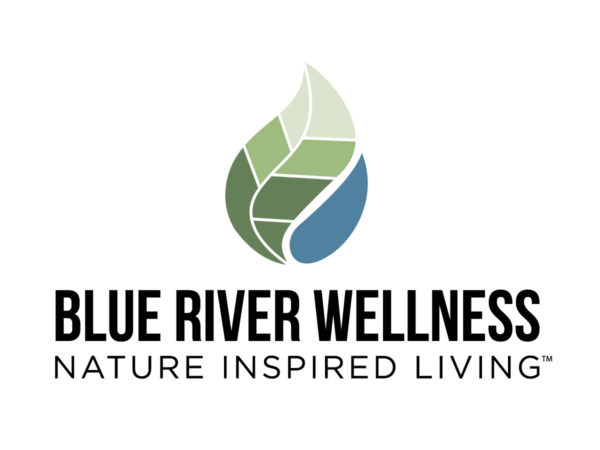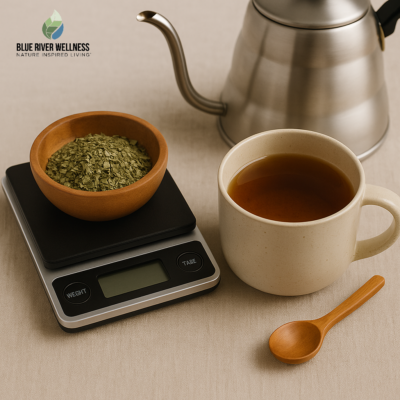
Responsible Use and Harm Reduction
At Blue River Wellness, we believe in education, transparency, and informed decision-making. While many of our customers find Kratom to be a helpful part of their wellness journey, it’s important to acknowledge and share key information about responsible use and potential risks.
Understanding Responsible Use
Kratom (Mitragyna speciosa) is a natural botanical traditionally used by communities in Southeast Asia. While many people find it beneficial for energy, focus, mood support, and relief from mild discomfort, it is not intended for daily or habitual use. The body can develop a tolerance over time, and using Kratom frequently—especially in high doses—may lead to dependency in some individuals.
To help reduce the risk of tolerance or habit formation, we recommend the following guidelines:
- Use Kratom no more than 2–3 days per week.
- Use the lowest effective serving size to achieve your desired effect.
- Take regular breaks—whether for several days or longer—to allow your body to reset.
- Rotate strains to minimize tolerance buildup.
- Do not mix Kratom with other substances, including alcohol, prescription medications, or recreational drugs.
Less is More
The principle of “less is more” with Kratom centers on intentional, mindful use rather than excess. Many people find that lower doses not only reduce the likelihood of tolerance and side effects, but also provide better and more sustainable benefits—whether it’s increased energy, focus, relaxation, or a subtle lift in mood. This approach encourages people to honor the plant’s natural properties by using just enough to feel enhanced, balanced, and supported.
At its heart, “less is more” reflects a philosophy of respect—for both the person’s body and the plant itself. It’s about using Kratom as a tool for well-being, rather than a crutch. And, in recognizing that moderation is key to long-term effectiveness. By tuning into your body and starting low and slow, people can build a healthy relationship with Kratom—one rooted in clarity, self-awareness, and harm reduction.
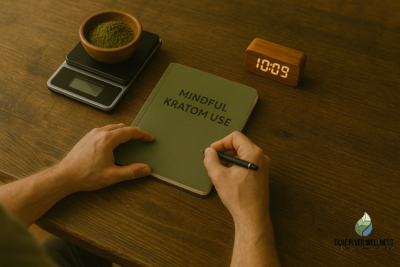
Is Kratom Habit Forming?
Kratom interacts with the body’s opioid receptors but is not an opioid itself. However, because of this interaction, some individuals may develop a physical or psychological dependency, especially with long-term or daily use. As with coffee, sugar, or numerous other naturally occurring psychoactive plants, Kratom may be habit-forming for some people depending on their usage patterns, reasons for taking, and personal physiology.
If you ever feel that your Kratom use is becoming compulsive or that you’re increasing your dosage to achieve the same effects, we encourage you to take a break and reflect on your usage. Listening to your body and mind is key to maintaining a healthy relationship with any substance.
Harm Reduction Over Promotion
Our intent is not to promote Kratom as a cure, treatment, or preventative for any medical condition. In accordance with FDA guidance, Blue River Wellness does not make any medical claims regarding the use of Kratom. The products offered on this site are not approved by the FDA, and Kratom is not intended to diagnose, treat, cure, or prevent any disease.
We support the growing movement of harm reduction; which promotes informed use, safety education, and the autonomy of individuals to make the best choices for themselves. Whether you are exploring Kratom for the first time or have used it before, we encourage moderation, mindfulness, and responsibility above all else.
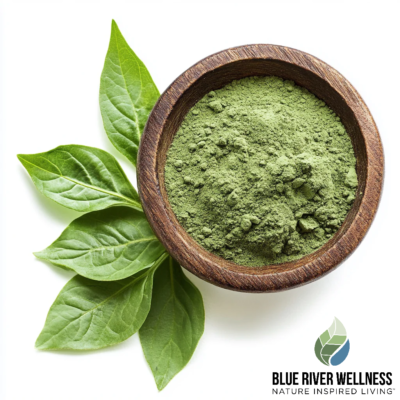
Legal & Safety Disclaimer
Kratom is not approved by the FDA for any medical use. The statements on this site have not been evaluated by the Food and Drug Administration.
Consult with a qualified healthcare provider before beginning any herbal regimen, especially if you are pregnant, nursing, taking medications, or have any medical conditions.
Safe and Responsible Use Guidelines
- Do not mix Kratom with alcohol or other substances
- Avoid using Kratom daily to prevent tolerance development
- Take regular breaks from Kratom use
- Start with small amounts and adjust gradually
- Keep Kratom products away from children and pets
When to Consult Healthcare Providers
Speak with a healthcare provider before using Kratom if you:
- Have existing health conditions
- Take any prescription medications
- Are pregnant or breastfeeding
- Have a history of substance use disorder
Kratom Age Restriction Notice
Our products are intended for adults 21 years of age and older. By purchasing from our website, you confirm that you are at least 21 years old. We do not sell Kratom to anyone under this age, and we reserve the right to cancel any orders that violate this policy.
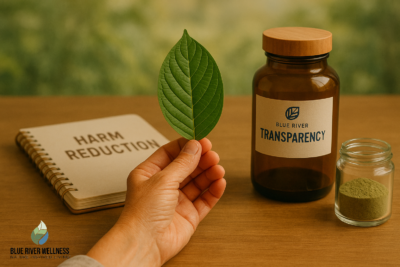
A Final Word
At Blue River Wellness, we aim to build a relationship of trust with our customers. That trust begins with education and transparency. Harm reduction is not just a policy—it’s a philosophy. It’s about empowering you to make safe, informed, and responsible decisions for your health and well-being.
